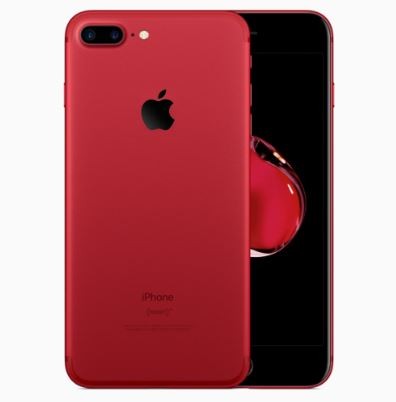By Josef Bell, | April 17, 2017

Designer Benjamin Geskin's concept of red iPhone 7 with a black front. (Twitter)
Samsung's work with the Galaxy S8 is nothing short of impressive - the device is powerful and a thing of beauty at the same time. It might be that the GS8 is the best Android handset to come out so far but when it comes to the flagship choice, it's always easy to go for Apple's latest and greatest - the iPhone 7 series.
Like Us on Facebook
Despite the GS8 hot and sexy, being the fresher release, for many smartphone users it seems easier to pick the iPhone 7 and what follows below are the solid reasons why:
Optimal hardware
The usual case when the iPhone flagship is pitted against the latest Android bets, and the same applies with the GS8-iPhone 7 comparison, Apple's creation is out-specced. But it doesn't necessarily mean that the former will lag behind in terms of performance.
Tests have shown that notwithstanding the GS8's 8-core Snapdragon 835 chip muscle with 4GB of RAM support, it was the iPhone 7 Plus that proved more responsive and to think that latter is equipped with an A10 processor that actively functions in two cores and 3GB of RAM provision.
The key to the 7 Plus' advantage? That would be, according to ZDNet, optimal integration of the iPhone hardware with the iOS mobile operating system, which highlights the fact that screaming device specs do not always make a winner.
Superior Apple/iOS ecosystem
Android no doubt has made a significant headway since its inception but Google's OS, which runs Samsung's flagship line, remains inferior to Apple's iOS in many levels. For one, firmware updates always come late even for top-tier devices like the GS8. The device will unbox with Android Nougat but one thing is sure, it will take too many months before the OS version will make way for Android 8.0 Oreo that will start rolling out in the second half of 2017.
Apple is scheduled to reveal iOS 11 in June and it will go live at around the same time the 2017 iPhone models are released. So by September, the iPhone 7 series will start running on iOS 11 while the earliest that the GS8 will chew in Android Oreo is by the close of 2017 or even later, that is in the early months of 2018.
Plus iOS on the iPhone is purely controlled by Apple, meaning no bloatware will jump out of the box with any iPhone models. The same cannot be said with the Galaxy S8 as the characteristic is only reserved to Google's Pixel phones.
Better support
Apple makes sure that iPhone users get only premium after-sales support, which is an area that for most part still requires room for improvements for Samsung. And this could prove a deal-breaker for many would-be Galaxy S8 buyers.
-
Use of Coronavirus Pandemic Drones Raises Privacy Concerns: Drones Spread Fear, Local Officials Say

-
Coronavirus Hampers The Delivery Of Lockheed Martin F-35 Stealth Fighters For 2020

-
Instagram Speeds Up Plans to Add Account Memorialization Feature Due to COVID-19 Deaths

-
NASA: Perseverance Plans to Bring 'Mars Rock' to Earth in 2031

-
600 Dead And 3,000 In The Hospital as Iranians Believed Drinking High-Concentrations of Alcohol Can Cure The Coronavirus

-
600 Dead And 3,000 In The Hospital as Iranians Believed Drinking High-Concentrations of Alcohol Can Cure The Coronavirus

-
COVID-19: Doctors, Nurses Use Virtual Reality to Learn New Skills in Treating Coronavirus Patients







